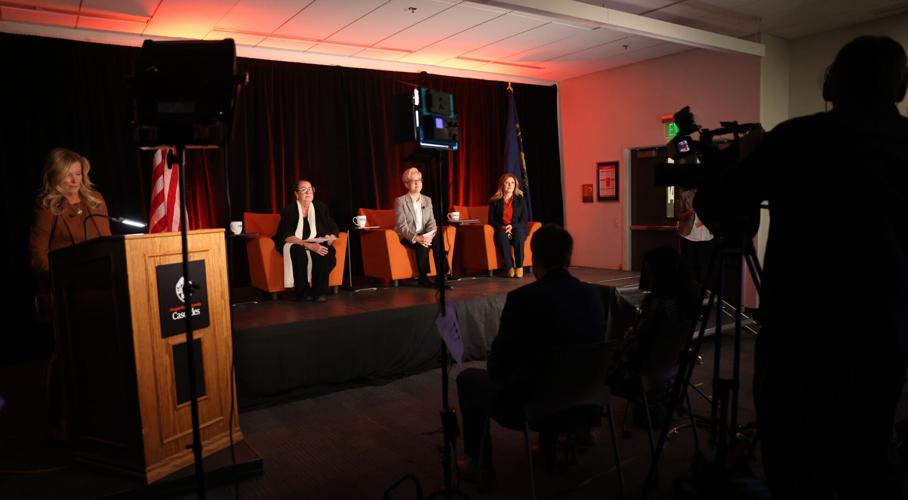The election marathon officially turned into a six-week sprint on Tuesday as the finish line for the Nov. 8 election starts coming into view.
Tuesday featured debates for the two tightest races on the ballot, held simultaneously: governor candidates in Bend and the 5th Congressional District debate in Portland.
Starting Tuesday, the state also moved the maximum time allowed to report campaign contributions and spending from 30 to seven days, shortening the legally sanctioned financial "hide-and-seek" of some candidates.
Dueling debates for governor and Congress
The 2022 political debates in Oregon have been one-off affairs, often put together by business or civic groups, sometimes with a television station that gets to set the rules for when and how anyone else gets to see the forums for the state's top offices.
The League of Women's Voters and the majority of political reporters who cover the governorship full-time have been largely absent from the planning of this year's debates.
Tuesday night was an instant example of confusion, with the governor's debate in Bend running simultaneously with the 5th Congressional District debate in Portland. Both were aired exclusively by one television station, which also exclusively showed the debate live on their website for audiences beyond their local areas.
The governor's debate was shown on KTVZ in Bend. At 7:30 p.m., the online feed suddenly stopped, then began re-running the debate from its beginning. In real-time, the candidates were giving their summations, which were seen only by broadcast and cable viewers of the station in the Bend area. The closing statements are now available by video, however.
Congressional quarrel gets limited exposure
The 5th Congressional District in Oregon is one of the most volatile and potentially significant of 435 House races in 2022. With Democrats holding a narrow 221-212 majority, with two vacancies, a handful of seats could decide which party will be the majority in 2023.
Oregon came into the May primaries with two open congressional seats. U.S. Rep. Peter DeFazio, D-Springfield, retired in the 4th district, while the state received a new 6th district as a result of population growth. It has no incumbent.
But a third seat opened up due to an upset victory in the 5th district by Terrebonne attorney Jamie McLeod-Skinner, a progressive Democrat, over incumbent U.S. Rep. Kurt Schrader, D-Canby, in the primary. Former Happy Valley Mayor Lori Chavez-DeRemer won the Republican primary with the help of top House Republicans during the primary.
Both Democrats and Republicans held closed primaries that shut out the largest share of voters, those unaffiliated with either party. But all registered voters regardless of party affiliation cast ballots in November.
The defeat of Schrader and the limited pools of voters who picked the two candidates has led some national forecasters, such as the Cook Political Report, to peg the race as a "toss-up."
The first debate of the 5th district race was held Tuesday at television station KATU in Portland. It ran simultaneously with the governor's debate in Bend. The congressional forum was broadcast by KATU, a Portland television station. It too was only available outside its broadcast area via the station website.
The evening debates left Oregon media scrambling for coverage. Many filed short, late stories on the governor's debate. The 5th district congressional debate ended up covered almost exclusively by KATU on its television station and website.
During the debate, the two candidates claimed the other was extremist in their views, KATU reported.
On the topic of abortion, Chavez-DeRemer said she was aligned with the mainstream on the issue while McLeod-Skinner held views on the extreme.
“We know that a majority of Oregonians and the majority of Americans want access to a reasonable commonsense approach. My opponent, she will tell you that she is for up-to-the last-minute abortion on demand, and fully taxpayer-funded,” she said.
McLeod-Skinner countered that Chavez-DeRemer would ban abortion even before a woman knew she was pregnant, KATU's website reported.
“She’s trying to take away our reproductive rights, I would protect them,” she said. “She celebrated the overturning of Roe v. Wade, I would codify Roe. I fundamentally believe that government has no right telling us what to do with our bodies.”
The candidates also argued over gun control, gas prices, and taxes.
KATU had Pacific University politics professor Jim Moore give a postmortem on the debate. He judged the candidates to be remarkably accurate on their facts, while they differed on the idea of where the political mainstream stands on issues.
“They kind of obfuscated when they needed to, because Lori Chavez-DeRemer doesn’t want to say she’s really, really tough on abortion, so she said, I’m with the mainstream, a lot," Moore said, according to KATU. "She wouldn’t tell us what the mainstream was,” he said. “Jamie McLeod-Skinner was pushed on the police stuff. I think she responded to that pretty well, but she also then didn’t go into a lot of detail about what her progressive policies would be.”
The scene in Bend
The three candidates at the governor's debate were a study in contrasts Tuesday night.
Seated side-by-side in matching orange chairs, they threw accusations and barbs at each other while rarely making eye contact. Their political pitches were aimed past the invitation-only audience at Tykeson Hall at Oregon State University-Cascades. Their gaze was locked on a wider audience, those watching on television or online.
Kotek was consistently expressive and leaned toward the camera and audience throughout the debate, literally on the edge of her chair at times. She raised her eyebrows incredulously and grimaced at some of Drazan and Johnson’s answers and accusations, particularly regarding homelessness and mental health.
Johnson's voice had the most emotional edge, rising with apparent subdued anger or passion as she gave her responses. She pulled at a white scarf in her lap while waiting her turn to speak.
Drazan sat back in her chair, imparting a look of calm and civility compared to her more emotive opponents. Her modulated delivery was often at odds with the sharp accusations against her opponents, especially Kotek, with whom she had a bitter dispute over what she says were broken promises for political parity on a redistricting committee during September's special session to draw new boundaries for legislative and congressional districts.
With answers and responses chopped into 60- and 30-second time increments as determined by the debate format, all three would often speed up their rate of speech as if competing on the "lightning round" of a gameshow.
All three at times seemed to be running against Gov. Kate Brown, the incumbent who is barred by term limits from running again.







(0) comments
Welcome to the discussion.
Log In
Keep it Clean. Please avoid obscene, vulgar, lewd, racist or sexually-oriented language.
PLEASE TURN OFF YOUR CAPS LOCK.
Don't Threaten. Threats of harming another person will not be tolerated.
Be Truthful. Don't knowingly lie about anyone or anything.
Be Nice. No racism, sexism or any sort of -ism that is degrading to another person.
Be Proactive. Use the 'Report' link on each comment to let us know of abusive posts.
Share with Us. We'd love to hear eyewitness accounts, the history behind an article.